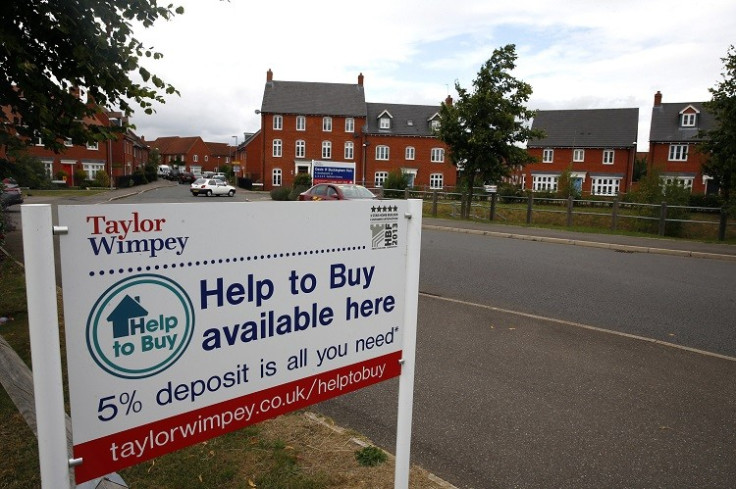UK Housing Bubble: Are we in One?

There are mixed messages coming from the UK's recovering housing market.
House prices are rising sharply as mortgages become cheaper. But both prices and approvals are below pre-recession levels.
So when some people argue that there is a housing bubble, while others say there's not – who do you believe?
IBTimes UK lays out the case on both sides of the debate over the pertinent question – is the UK in the middle of a housing bubble?
Yes, we are in a bubble.
Waves of mortgage credit are washing through the economy with government schemes such as Help to Buy making home loans cheaper and easier to access.
What's more, the Bank of England base rate is at its record-low of 0.5%, an abnormal circumstance that leaves borrowers at risk from interest rate shocks when this begins to rise again.
Yet despite the free-flowing credit, earnings are falling in real terms and many struggle to pay their bills.
Housing supply is incredibly weak, even without higher demand in the market.
Official estimates put the level of annual house building needed to meet demand at 290,500. Just 133,670 new homes were built in 2013.
So cheap credit will lead to increased mortgage borrowing, leaving more people leveraged with debt.
More mortgage borrowing means higher demand in the housing market, putting extra strain on the already taut supply.
House prices will rise, leading to people having to borrow more money to pay for increasingly expensive properties.
This could all go pop when the Bank of England hikes rates as it suggests it will do, gradually, from early 2015.
Higher rates mean higher mortgage repayments, which could push highly leveraged households to default, especially as incomes are so weak, when they can no longer afford to service their debt.
A ripple of mortgage defaults, triggered by higher rates, would lead to foreclosures, bank losses, tighter credit conditions, and the unwinding of house prices – a well and truly burst bubble.
An academic study by Professor James Mitchell, head of Warwick Business School's Economic Modelling and Forecasting Group, measured house prices against earnings.
It concluded that there were house price bubbles in ten out of 13 regions in the UK.
"Rising house prices are proving helpful in leading the UK out of its longest recession in living memory," said Mitchell.
"But with house prices at such historically unaffordable levels there is a risk that when interest rates start to return to more normal levels, which they will if not next year then the year after, that the finances of both households and banks are stretched to breaking point.
"This raises the spectre of falling house prices, negative equity, bad assets on banks' balance sheets and a return to the so-called Great Recession we have been so slowly emerging from."
No, we are not in a bubble.
Although house prices are rising in all UK regions, most are still well below their pre-recession peaks.
Moreover, mortgage approvals are running at a level around 70,000 a month – far below the 90,000 before the financial crisis.
House building is well below demand, but this has been true historically and is not a new phenomenon.
It also lifted by 28% in 2013 on the year before according to the National House Building Council, showing that construction firms are reacting to the upturn in housing demand.
Inflation is falling and wages are gradually picking up, meaning there is an imminent end to the real terms decline in incomes seen in recent years.
Mortgage borrowers may be exposed to interest rate hikes, but there will be few shocks. The Bank of England has said consistently that when it thinks the economic recovery has taken hold it will raise its base rate very slowly from 0.5%.
They are alert to the risks of a sudden steep rate hike and would not threaten the UK economy by making such a move.
In a comprehensive report on the UK economy, the Institute for Fiscal Studies (IFS) found there to be "no clear evidence" that there is a housing bubble.
It said house prices are 9% below their pre-crisis peak in nominal terms and 25% below in real terms.
Data from Nationwide Building Society shows the house price to earnings ratio, a useful indicator of a housing bubble, is still following its long-term trend. There is no sharp change.
Furthermore, mortgage costs are not eating up as much household disposable income as they have in the past.
Since 1974, the average proportion of UK households spending more than a quarter of their disposable income on repaying the interest on mortgages was 8.5%. In 2011, it was just 5.4%.
If there were any concerning changes to the housing market, the Bank of England's financial policy committee is poised to use its powers to put the brakes on lending by imposing stricture credit rules and conditions on the financial sector.
© Copyright IBTimes 2025. All rights reserved.






















